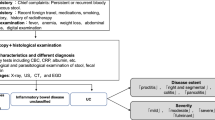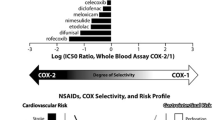Abstract
Background
Immunomodulator monotherapy is an important component in the treatment of inflammatory bowel disease (IBD). However, there is conflicting literature about thiopurines maintaining long-term remission in patients with active IBD.
Aim
To determine the durable clinical remission rate in adults with Crohn’s disease (CD) or ulcerative colitis (UC) on thiopurine monotherapy over 5 years.
Methods
We performed a retrospective analysis of adult patients identified at McGill University Health Centre from 2009 to 2012. We included IBD patients who initiated thiopurine monotherapy and were in remission for at least 3 months (Harvey–Bradshaw Index (HBI) < 5 points for CD and partial Mayo Score (pMS) < 2 points in UC). The primary endpoint was sustained clinical remission on thiopurines during a 5-year follow-up. This included patients who had not relapsed or discontinued the drug due to side effects. The secondary endpoint was clinical relapse over the follow-up period, which was defined as HBI > 5 in CD and pMS > 2 in UC.
Results
There were 148 patients included in the study (100 CD; 48 UC). At 5 years, 23% (34/148) patients remained in clinical remission on thiopurine monotherapy (25 CD and 9 UC patients). Thirty-three percent (33/100) of CD and 46% (22/48) of UC patients relapsed while on thiopurines. There was no difference in relapse rates between CD and UC patients. Eighty-four percent (42/50) of patients with CD with side effects and all UC (17/17) patients who experienced side effects discontinued the drug.
Conclusion
This analysis demonstrates that there is poor sustainability of clinical remission in IBD patients on thiopurine monotherapy given that a high proportion of patients discontinue thiopurines due to either relapse or side effects.




Similar content being viewed by others
Abbreviations
- IBD:
-
Inflammatory bowel disease
- UC:
-
Ulcerative colitis
- CD:
-
Crohn’s disease
- HBI:
-
Harvey–Bradshaw Index
- pMS:
-
Partial Mayo Score
- AZA:
-
Azathioprine
- 6-MP:
-
Mercaptopurine
References
Fumery M, Singh S, Dulai PS, et al. Natural history of adult ulcerative colitis in population-based cohorts: a systematic review. Clin Gastroenterol Hepatol. 2018;16:343–356.e3.
Burisch J, Kiudelis G, Kupcinskas L, et al. Natural disease course of Crohn’s disease during the first 5 years after diagnosis in a European population-based inception cohort: an Epi-IBD study. Gut. 2019;68:423–433. https://doi.org/10.1136/gutjnl-2017-315568.
Sahasranaman S, Howard D, Roy S. Clinical pharmacology and pharmacogenetics of thiopurines. Eur J Clin Pharmacol. 2008;64:753–767.
Candy S, Wright J, Gerber M, et al. A controlled double blind study of azathioprine in the management of Crohn’s disease. Gut. 1995;37:674–678.
Markowitz J, Grancher K, Kohn N, et al. A multicenter trial of 6-mercaptopurine and prednisone in children with newly diagnosed Crohn’s disease. Gastroenterology. 2000;119:895–902.
O’Donoghue DP, Dawson AM, Powell-Tuck J, et al. Double-blind withdrawal trial of azathioprine as maintenance treatment for crohn’s disease. Lancet. 1978;312:955–957.
Pearson DC, May GR, Fick G, et al. Azathioprine for maintaining remission of Crohn’s disease. Cochrane Database Syst Rev. 2000;CD000067. https://doi.org/10.1002/14651858.CD000067.
Pearson DC, May GR, Fick GH, et al. Azathioprine and 6-mercaptopurine in Crohn disease. A meta-analysis. Ann Intern Med. 1995;123:132–142.
Present DH, Korelitz BI, Wisch N, et al. Treatment of Crohn’s disease with 6-mercaptopurine. A long-term, randomized, double-blind study. N Engl J Med. 1980;302:981–987. https://doi.org/10.1056/NEJM198005013021801.
Timmer A, McDonald JWD, Tsoulis DJ, et al. Azathioprine and 6-mercaptopurine for maintenance of remission in ulcerative colitis. Cochrane Database Syst Rev. 2012;CD000478. https://doi.org/10.1002/14651858.CD000478.pub3.
Panes J, Lopez-Sanroman A, Bermejo F, et al. Early azathioprine therapy is no more effective than placebo for newly diagnosed Crohn’s disease. Gastroenterology. 2013;145:766-74.e1.
Cosnes J, Bourrier A, Laharie D, et al. Early administration of azathioprine vs conventional management of Crohn’s disease: a randomized controlled trial. Gastroenterology. 2013;145:758–765.e2. https://doi.org/10.1053/j.gastro.2013.04.048.
Chaparro M, Ordas I, Cabre E, et al. Safety of thiopurine therapy in inflammatory bowel disease: long-term follow-up study of 3931 patients. Inflamm Bowel Dis. 2013;19:1404–1410.
Fraser AG, Orchard TR, Jewell DP. The efficacy of azathioprine for the treatment of inflammatory bowel disease: a 30 year review. Gut. 2002;50:485–489.
Anstey A, Lennard L, Mayou SC, et al. Pancytopenia related to azathioprine—an enzyme deficiency caused by a common genetic polymorphism: a review. J R Soc Med. 1992;85:752–756.
Connell WR, Kamm MA, Ritchie JK, et al. Bone marrow toxicity caused by azathioprine in inflammatory bowel disease: 27 years of experience. Gut. 1993;34:1081–1085.
Gisbert JP, Gonzalez-Lama Y, Mate J. Thiopurine-induced liver injury in patients with inflammatory bowel disease: a systematic review. Am J Gastroenterol. 2007;102:1518–1527.
D’Haens G, Baert F, van Assche G, et al. Early combined immunosuppression or conventional management in patients with newly diagnosed Crohn’s disease: an open randomised trial. Lancet. 2008;371:660–667.
Lemann M, Mary JY, Colombel JF, et al. A randomized, double-blind, controlled withdrawal trial in Crohn’s disease patients in long-term remission on azathioprine. Gastroenterology. 2005;128:1812–1818.
Mate-Jimenez J, Hermida C, Cantero-Perona J, et al. 6-mercaptopurine or methotrexate added to prednisone induces and maintains remission in steroid-dependent inflammatory bowel disease. Eur J Gastroenterol Hepatol. 2000;12:1227–1233.
Rosenberg JL, Levin B, Wall AJ, et al. A controlled trial of azathioprine in Crohn’s disease. Am J Dig Dis. 1975;20:721–726. https://doi.org/10.1159/000443127.
Summers RW, Switz DM, Sessions JT Jr, et al. National cooperative Crohn’s disease study: results of drug treatment. Gastroenterology. 1979;77:847–869.
Willoughby JM, Beckett J, Kumar PJ, et al. Controlled trial of azathioprine in Crohn’s disease. Lancet. 1971;2:944–947.
Jewell DP, Truelove SC. Azathioprine in ulcerative colitis: final report on controlled therapeutic trial. Br Med J. 1974;4:627–630.
van Gennep S, de Boer NK, D’Haens GR, et al. Thiopurine treatment in ulcerative colitis: a critical review of the evidence for current clinical practice. Inflamm Bowel Dis. 2017;24:67–77.
Gearry RB, Barclay ML, Burt MJ, et al. Thiopurine drug adverse effects in a population of New Zealand patients with inflammatory bowel disease. Pharmacoepidemiol Drug Saf. 2004;13:563–567.
Chande N, Patton PH, Tsoulis DJ, et al. Azathioprine or 6-mercaptopurine for maintenance of remission in Crohn’s disease. Cochrane Database Syst Rev. 2015;CD000067. https://doi.org/10.1002/14651858.CD000067.pub3.
Colombel JF, Sandborn WJ, Reinisch W, et al. Infliximab, azathioprine, or combination therapy for Crohn’s disease. N Engl J Med. 2010;362:1383–1395. https://doi.org/10.1056/NEJMoa0904492.
Hazlewood GS, Rezaie A, Borman M, et al. Comparative effectiveness of immunosuppressants and biologics for inducing and maintaining remission in Crohn’s disease: a network meta-analysis. Gastroenterology. 2015;148:344–54.e5.
Shah ED, Siegel CA, Chong K, et al. Evaluating study withdrawal among biologics and immunomodulators in treating ulcerative colitis: a meta-analysis of controlled clinical trials. Inflamm Bowel Dis. 2016;22:933–939.
Suarez Ferrer C, Gonzalez-Lama Y, Gonzalez-Partida I, et al. Usefulness of thiopurine monotherapy for Crohn’s disease in the era of biologics: a long-term single-center experience. Dig Dis Sci. 2019;64:875–879. https://doi.org/10.1007/s10620-018-5381-0.
Moran GW, Dubeau M-F, Kaplan GG, et al. Clinical predictors of thiopurine-related adverse events in Crohn’s disease. World J Gastroenterol. 2015;21:7795–7804.
Qiu Y, Mao R, Zhang SH, et al. Safety profile of thiopurines in Crohn disease: analysis of 893 patient-years follow-up in a southern China Cohort. Medicine (Baltimore). 2015;94:e1513.
Funding
None.
Author information
Authors and Affiliations
Corresponding author
Ethics declarations
Conflict of interest
T. Bessissow has received honoraria and acted as a consultant for Janssen, AbbVie, Takeda, and Pfizer and acted as speaker for Janssen, AbbVie, Takeda, Ferring, Actavis, PendoPharm, and Shire. T. Bessissow has served as a speaker, a consultant, and an advisory board member for Janssen, AbbVie, Takeda, Pfizer, Ferring, PendoPharm, Shire and has received research funding from AbbVie and Janssen. PL Lakatos has been a speaker and/or advisory board member: AbbVie, EGIS, Falk Pharma, GmbH, Ferring, Genetech, Jansen, Kyowa, Hakko Kirin Pharma, Mitsubishi Tanabe Pharma Corporation, MSD, Otsuka Pharma, Pharmacosmos, Pfizer, Roche, Shire, and Takeda and has received unrestricted grants: AbbVie, MSD, and Pfizer. Waqqas Afif has served as a speaker and/or advisory board for AbbVie, Janssen, Takeda, Merck, Pfizer, Ferring, Shire, and received research grants from AbbVie, Theradiag, and Prometheus. Alain Bitton has received honorarium for participation in advisory boards from Allergan. Alain Bitton is a Consultant, Advisory Board: AbbVie, Janssen, Shire, Warner Chilcott, Takeda, and Speaker: AbbVie, Janssen, Shire, Warner Chilcott, Aptalis. GW has been a speaker and/or advisory board member for AbbVie, Janssen, Pfizer, Shire, and Takeda. B. Balram, Y. Theoret, and J. Lubov have no conflicts of interest to report.
Additional information
Publisher's Note
Springer Nature remains neutral with regard to jurisdictional claims in published maps and institutional affiliations.
Electronic Supplementary Material
Below is the link to the electronic supplementary material.
Rights and permissions
About this article
Cite this article
Balram, B., Lubov, J., Theoret, Y. et al. Poor Drug Sustainability in Inflammatory Bowel Disease Patients in Clinical Remission on Thiopurine Monotherapy. Dig Dis Sci 66, 1650–1657 (2021). https://doi.org/10.1007/s10620-020-06427-8
Received:
Accepted:
Published:
Issue Date:
DOI: https://doi.org/10.1007/s10620-020-06427-8




